Abraham and Bassja Datnowsky
Abraham Datnowsky
Abram Tevel Datnowsky
Abram Tubias Datnowsky
Abram Tubiash Datnowsky
Abraham Datnowsky was born on November 7, 1854, the son of Jossel (Yossef) Meier Datnowsky and Sore (Sarah) Datnowsky.
Abraham was most likely born in Dotnuva (Polish: Datnów, Russian: Датновъ, German: Dotnau)), a small town of about 400 inhabitants in Kaunas (Kovno) County, at the time part of the Russian Empire, now in Lithuania. He had one younger brother, Moritz (Movsha).
(His daughter Bertha listed his place of birth as "Kovno" in a 1938 document, but she probably used this to mean Kovno county. Her hometown - "Heimat" - was listed as Datnow in her own university matriculation; The family name derives from the town, and Abraham's brother was born in Datnow.)
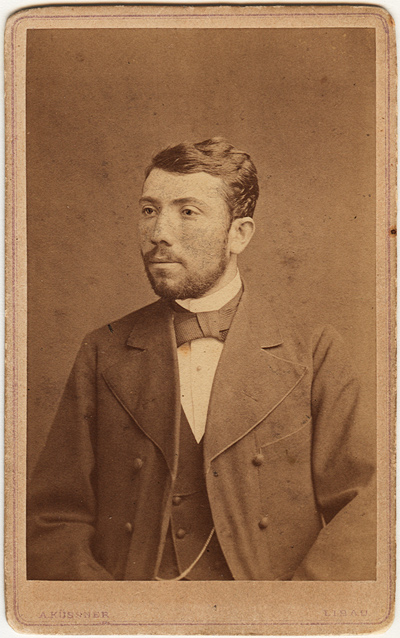
Abraham Datnowsky (Libau)
Bassja Rabinowitz
Alternate spellings: Bassia, Basha, Bassja, Batia, Bass, Rabinovitch.
Bassja was born on August 20, 1865, in Liepaja (Libau), the daughter of Yakov (Jakov) Rabinowitz. Liepaja was then part of the Russian Empire and is now in Latvia.
The earliest photo of Bassja was taken in a studio in Dinaburg (Daugavpils, Dvinsk), about 400 kms (260 miles) from Liepaja, suggesting that she may have lived there at some point.
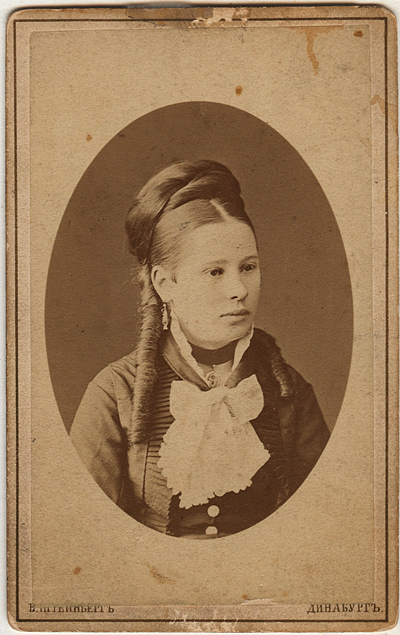
Bassja Datnowsky
Marriage
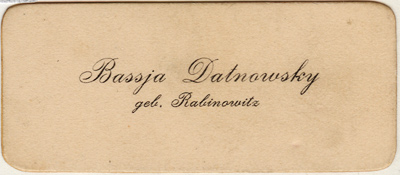
Bassja Datnowsky's calling card in German
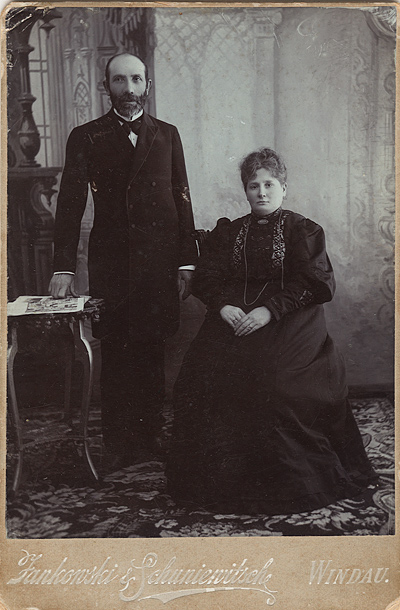
Abraham and Bassja Datnowsky, Windau, 1900?
Abraham Datnowky and Bassja Rabinowitz were married and had four children: Bertha (Chaja Braina), Ronya (Rebeccah), Liska (Eva) and Israel (Isrolke).
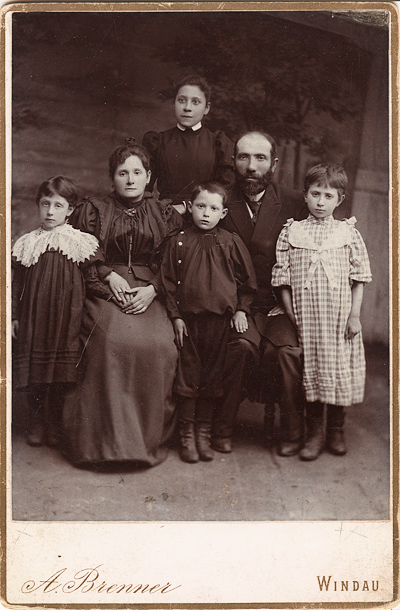
Abraham and Bassja Datnowsky, with Eva (Liska), Bertha, Israel and Ronya. Windau, 1898
It's not clear what the profession of Abraham Datnowsky was. According to Alex Mallat, he was a furniture manufacturer; According to Michael Rosenberg, however, he was "some kind of merchant".
The only official record of his profession is found in his daughter Ronya's birth certificate, where he is listed as "Kommissioner" - or "Commissionaire", a "Commission Agent", that is "a person who buys or sells goods for others on a commission basis."
Possibly confirming this, the 1892 Libau Address Book lists under "Commission Business" the company of Rabinovitz & Co. Also, in the list of companies ("Firmen"), Rabinowitz & Co. is listed for "Commission und Bank Gesch" - "Commission and banking business." It is thus possible that Abraham may have worked for a company that belonged to his wife's family.
The family must have been sufficiently well-to-do to send their daughter Bertha to study at the University of Bern, Switzerland, between 1903 and 1905.
They reportedly had house help, although this was the norm for middle-class Jewish families in Latvia at the time.
Windau
While early studio photos of the Datnowsky family were taken in Libau, later pictures were taken in Windau (now Ventspils), starting around 1898, suggesting that the family moved there in the late 1890's. In 1907, Abraham was listed in the Courland Voters Lists for the Russian Duma (Parliament) election in Windau, and their daughter Ronya attended the Girls Gymnasium in that city until 1909.
Abraham returned to Libau, presumably after the death of Bassja. (In July 1915, Israel Auerbach wrote to Abraham's son Isrolke "You probably already know that the place where you were born, Libau, was occupied by the Germans? Windau has also been added! Hopefully Libau will remain German for all the future, so that your whole family can get rid of the Russian curse in one fell swoop.")
| Courland Voters Lists 1907 Duma | ||||||
|---|---|---|---|---|---|---|
| Entry Number | Surname | Given Name | Father | Town | Date | Comments |
| B -181 | DATNOVSKY | Abram | Yossel | Ventspils (Windau) | 1907 | Eligibility 4 |
Courland Voters Lists for the Russian Duma election. Windau, 1907.
Source: jewishgen.org
To be eligible to vote, voters had to be "of good character" and in good standing in the community. Based on their position in the community, voters belonged to different categories of eligibility. Whereas voters in Section A were the most prominent citizens likely to own substantial real estate or business interests, voters in the larger group B had less economic and social status.
| Voters Categories | |
|---|---|
| 1 | Those with real property |
| 2 | Those carrying on a retail business - includes small shopkeepers |
| 3 | Those engaged in manufacturing business |
| 4 | Those paying house tax |
| 5 | Those paying industrial or business tax |
| 6 | Those living in separate flats |
| 7 | Government employees |
| 8 | Those drawing a government pension (former government employees). |
In 1907, Abraham belonged to this second group, and his "Eligibility 4" rank means that he paid a house tax. (According to A. Badayev's "The Bolsheviks in the Tsarist Duma", "[Those] who paid a special house-tax, i.e., those who occupied the large and expensive apartments.")
Death of Bassja
In 1910, Bassja died of breast cancer. She was about 45.
(I estimated the year to be 1909 based on the inscription on her tombstone; Bertha however listed 1910 in a 1938 document.).
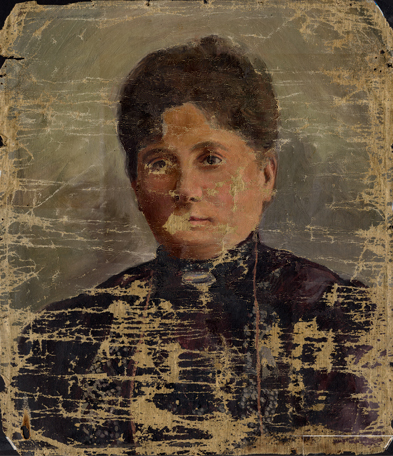
Bassja Datnowsky - painting after photograph
About a year earlier, Abraham's mother had died, and the following year so would his father Jossel.
After Bassja's death, Abraham proved incapable of taking care of his business. Either overcome by grief, or simply not up to the task without the help of his wife, he seems to have let things fall apart.
According to Alex Mallat, he was "tired". He went to people's houses (at least to their house), would sit in an armchair, would start to read a newspaper then would fall asleep. According to Michael Rosenberg, "he was 'addicted' to news and newspapers".
Morris Halle tells a similar story in his memoirs:
"[Abraham Datnowsky] was a relative of my mother's but I do not know preciseIy how he is related to us."
"Mr. D used to come to visit us every afternoon. He would walk into our dining room and sit down on a chair that stood in a corner by the window next to our upright piano, and open the Yiddish newspaper which he would proceed to read.
My mother would give him tea, and both [my sister] Rita and I tried to engage him in conversation, but he would pay no attention to us. In fact, Rita used to play with his shoes, claiming that she was either shining the shoes or giving him a pedicure, but he would sit there and pay absolutely no attention."
A few relatives have also hinted (or speculated) that his drink of choice was stronger than tea, although it's impossible to know for sure.
He may have needed the financial help of his son-in-law Moritz Abraham in later years, according to a letter dated November 15, 1918, from Moritz to Asher Mallat:
"'Papa' is doing well, I have done the necessary to ensure his upkeep since the beginning of the war."
("Papa va de meme très bien, j'ai dès le commencement de la guerre fait le nécessaire pour son entretien.")
1920's: Germany
Abraham lived Berlin in the 1920's. His move may have be caused by the Bolshevik Revolution and the creation of the Baltic States, which triggered a partial diaspora of Latvian Jews after 1920. Another possible reason may have been that his brother Moritz had apparently moved to Germany, and so had his daughter Bertha.
According to Alex Mallat, Abraham moved to Germany in 1924 and "lived a great deal at Bertha's in Berlin," although a number of postcards and letters he sent to his children and in-laws show his address in a pension in Berlin.
Two photos of Abraham and his brother Moritz Datnowsky taken in Berlin and dated 1922 suggest that - if the date is correct - Abraham actually moved there a few years sooner.
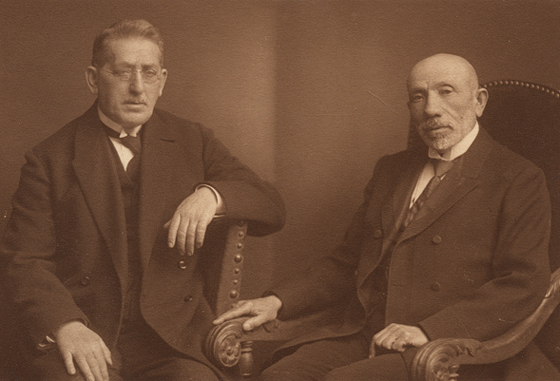
Moritz and Abraham Datnowsky, Berlin 1920
Earlier still, Abraham appears on photos taken in Kolberg, a resort on the Baltic where his grandchildren Uriel and Gisy, and their cousin Isy, spent the summer.
Here he is seen on a studio portrait made to look like it was taken on the beach, taken in 1920.
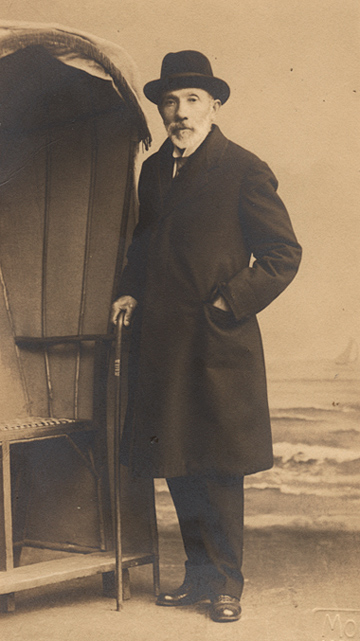
Abraham Datnowsky, Kolberg (Baltic), 1920
Another photo, this one dated 1920 in Berlin (but could possibly be in Kolberg), shows him surrounded by the children.
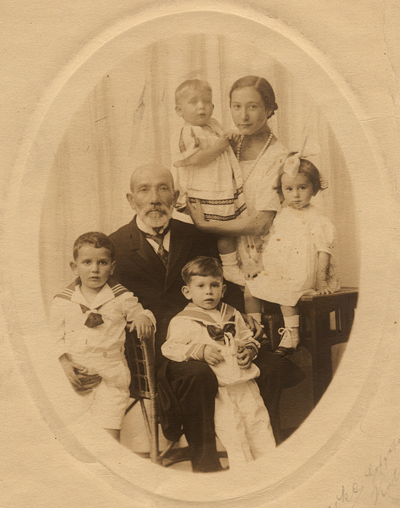
Abraham Datnowsky, Berlin? (or Kolberg?), 1920
Gadi Mallah, Abraham Datnowsky, Gisi Abraham, Isi (Alex) Mallah, Lea Auerbach, Uli Abraham.
Back to Libau
Abraham sent this Rosh Hashanah card to his family from Libau on October 1927, suggesting that he either alternated between between the two countries, or had moved back to Latvia after spending a few years in Berlin.
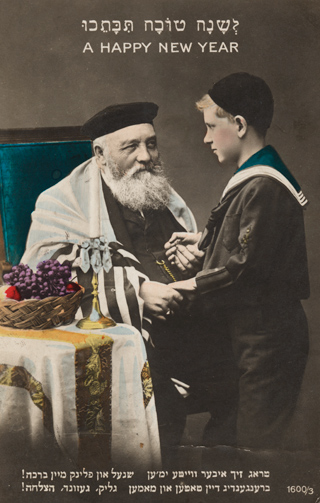
Rosh Hashanah wishes from Abraham to his grand children, October 1927
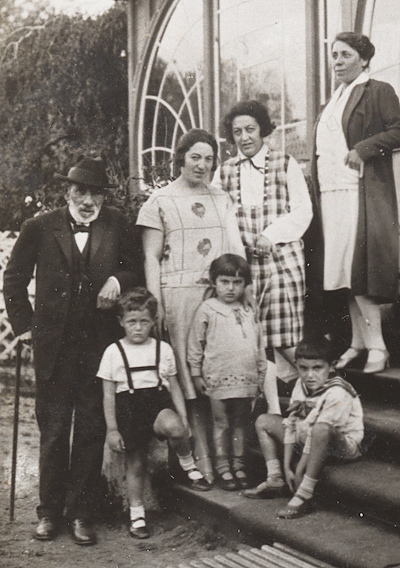
Abraham Datnowsky on the steps of the Libau Kurhaus (Spa), ca 1928, Libau. Bertha is standing first from the right.
(Photo courtesy of Morris Halle)
Abraham died on November 1, 1928 (19 Cheshvan 5689) (according to the online transcript of the Liepaja Jewish Cemetery Book 1909-1941).
| Liepaja Jewish Cemetery Burials 1909-1941 | |||||
|---|---|---|---|---|---|
| Last Name | Given Names | Father's Name | Death Date (Gregorian) |
Jewish Date | Jewish Year |
| DATNOWSKY | Abram | Josef | 1 November, 1928 | 19 Cheshvan | 5689 |
Source: http://www.liepajajews.org/cem/D.htm
Morris Halle: "[Abraham Datnowsky] died in 1928, and I remember that your grandmother [Ronya] stayed at our house when she came to Libau for the funeral."
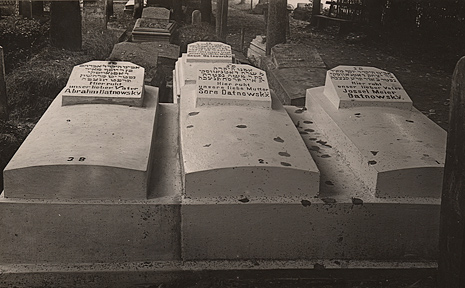
Tombstones of Abraham Datnowsky, Sore Datnowsky, Jossel Meier Datnowsky. Libau.
Although it's impossible to read, assuming the fourth tombstone is Bassja's.
The cemetery was not destroyed during the war and the Datnowsky graves still exist today.
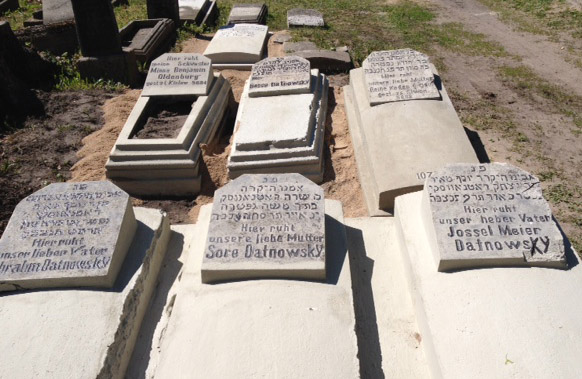
Datnowsky tombstones, Libau
Liepaja Jewish cemetery, 20 Cenkones Street.
Source: liepajajewishheritage.lv
- Special Thanks:
- Bitia Biesel, for Bassja's painting
- Interviews:
- Bitia Biesel
- Morris Halle
- Michael Rosenberg
- Alex Mallat
- Sources:
- JewishGen.org (1907 Duma registration list)
- genealogy.org.il (ISGRA. Bertha's 1938 form with Abraham and Bassja's dates of birth.)
- usdine.free.fr (The Riga Rabbinate Vital Records)
- usdine.free.fr (1892 Libau Address Book)
- liepajajewishheritage.lv
- Alexandre Mallat: "Manuscrit de la Mer Egée".
- Morris Halle: "Morris in Latvia", 1984.